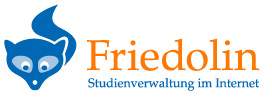| Name des Moduls | [350110] Functional Materials and Nanomaterials | Bezeichnung des Moduls | MMC P001 |
| Studiengang | [733] - Chemistry of Materials | ECTS Punkte | 10 |
| Arbeitsaufwand für Selbststudium | 195 | Häufigkeit des Angebotes (Modulturnus) | jedes 2. Semester (ab Sommersemester) |
| Arbeitsaufwand in Präsenzstunden | 105 | Dauer des Moduls | 1 |
| Arbeitsaufwand Summe (Workload) | 300 | ||
| Modul-Verantwortliche/r | Prof. Dr Benjamin Dietzek-Ivansic, Prof. Dr Felix H. Schacher |
| Voraussetzung für die Vergabe von Leistungspunkten (Prüfungsform) | Exam/test on the content dealt within the lecture and seminar (70%); laboratory report (30 %) |
| Zusätzliche Informationen zum Modul | none |
| Empfohlene Literatur | Will be recommended at the beginning of the module. |
| Unterrichtssprache | English |
| Voraussetzung für die Zulassung zum Modul | 733 MSc Chemistry of Materials: none |
| Empfohlene bzw. erwartete Vorkenntnisse | 733 MSc Chemistry of Materials: none |
| Verwendbarkeit (Voraussetzung wofür) | 733 MSc Chemistry of Materials: Module required to complete master’s thesis |
| Art des Moduls (Pflicht-, Wahlpflicht- oder Wahlmodul) | 733 MSc Chemistry of Materials: Compulsory module |
| Zusammensetzung des Moduls / Lehrformen (V, Ü, S, Praktikum, …) | Lecture (3 SWS), seminar (1 SWS), laboratory practical (3 SWS) |
| Inhalte | This module focuses on preparative, structural and functional aspects of functional materials and nanomaterials. It includes:
|
| Lern- und Qualifikationsziele | Students understand the fundamental principles of functional materials and nanomaterials, their subdivision into different material classes, and have knowledge about various characterization techniques for the investigation of structure, morphology, surface or material properties. |
| Voraussetzung für die Zulassung zur Modulprüfung | Laboratory course and oral presentation must be completed successfully prior to the exam. |


